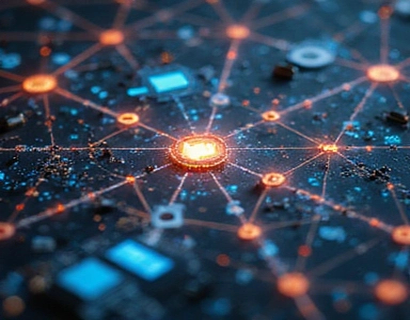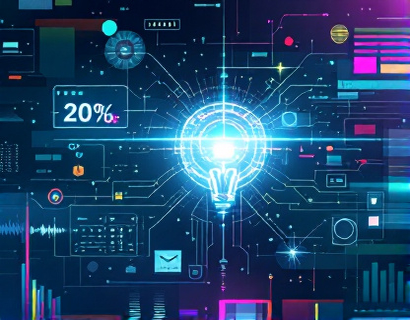Unlocking Advanced Digital Transformation: The Synergy of Crypto and AI
The intersection of cryptocurrency and artificial intelligence (AI) represents a frontier in digital innovation, offering unprecedented opportunities for tech pioneers and early adopters. This convergence is not merely a technological curiosity but a transformative force reshaping the digital landscape. As we delve into the intricacies of this synergy, it becomes evident that the merging of these two domains is driving the next wave of technological advancements, providing valuable insights and tools for those at the forefront of digital transformation.
The foundation of this transformation lies in the unique properties of blockchain technology, the underlying infrastructure of cryptocurrencies, and the computational prowess of AI. Blockchain's decentralized, transparent, and secure nature complements AI's ability to process and analyze vast amounts of data with unprecedented speed and accuracy. Together, they create a powerful ecosystem that enhances trust, efficiency, and innovation across various sectors.
Enhancing Trust and Security
One of the most significant benefits of integrating AI with cryptocurrency is the enhancement of trust and security in digital transactions. AI algorithms can detect and prevent fraudulent activities by analyzing patterns and anomalies in transaction data. This real-time monitoring and predictive analysis significantly reduce the risk of cyber threats, making cryptocurrency transactions more secure. Moreover, smart contracts, self-executing contracts with the terms directly written into code, leverage AI to automate and enforce contractual obligations, ensuring that all parties adhere to agreed terms without the need for intermediaries.
The combination of AI and blockchain also improves the verification process of identities and assets. Decentralized identity management systems powered by AI can authenticate users and verify transactions with high accuracy, reducing the likelihood of identity theft and fraud. This not only enhances user trust but also facilitates seamless and secure interactions in the digital economy.
Optimizing Data Processing and Analysis
AI's strength in data processing and analysis is a game-changer for the cryptocurrency space. The vast amounts of data generated by blockchain networks can be overwhelming and difficult to manage. AI algorithms, particularly machine learning models, can sift through this data to extract meaningful insights, identify trends, and make predictive forecasts. This capability is invaluable for traders, investors, and businesses looking to make informed decisions based on data-driven insights.
For instance, AI-driven analytics can help in market sentiment analysis by monitoring social media, news feeds, and other online platforms to gauge public opinion and predict market movements. This real-time analysis can provide a competitive edge in the fast-paced world of cryptocurrency trading. Additionally, AI can optimize trading strategies by identifying optimal entry and exit points, managing risk, and maximizing returns, thereby enhancing the overall efficiency of cryptocurrency investments.
Innovations in Cryptocurrency Development
The integration of AI in cryptocurrency development is leading to the creation of more sophisticated and functional digital assets. AI can assist in the design and optimization of blockchain protocols, ensuring they are scalable, secure, and efficient. For example, AI can help in the development of consensus mechanisms that are both energy-efficient and robust against attacks, addressing some of the critical challenges faced by current blockchain networks.
Moreover, AI-driven tools can facilitate the creation of utility tokens and decentralized applications (dApps) that offer real-world value. By analyzing user behavior and market needs, AI can guide developers in designing tokens and dApps that solve specific problems or meet particular demands, thereby increasing their adoption and utility. This data-driven approach to cryptocurrency development ensures that new projects are more likely to succeed and gain traction in the market.
Enhancing User Experience
The user experience in the cryptocurrency space is being significantly improved through the application of AI technologies. User interfaces and experiences can be personalized using AI, adapting to individual preferences and behaviors. This personalization extends to wallet interfaces, trading platforms, and other cryptocurrency-related services, making them more intuitive and user-friendly.
AI-powered chatbots and virtual assistants are also becoming common in the crypto space, providing users with instant support and guidance. These AI-driven tools can handle a wide range of queries, from basic questions about cryptocurrency concepts to complex transactions and technical issues, enhancing the overall user experience and reducing the learning curve for new users.
Driving Financial Inclusion
One of the most promising aspects of the crypto-AI synergy is its potential to drive financial inclusion. AI can help in creating more accessible and inclusive financial systems by reducing barriers to entry and providing services to underserved populations. For example, AI-driven identity verification systems can enable unbanked individuals to access cryptocurrency services by using alternative identity proofs such as biometric data.
Furthermore, AI can facilitate cross-border transactions by streamlining the process and reducing costs. By analyzing global financial patterns and regulatory environments, AI can optimize transaction routes and methods, making international payments faster and more affordable. This is particularly beneficial for individuals and businesses in developing countries, where traditional financial systems often pose significant challenges.
Challenges and Considerations
Despite the numerous benefits, the integration of AI and cryptocurrency is not without challenges. One of the primary concerns is the regulatory landscape. As both fields evolve rapidly, regulators are struggling to keep pace, leading to a patchwork of regulations that can hinder innovation. Tech pioneers and early adopters must stay informed about regulatory developments and ensure compliance to avoid legal pitfalls.
Another challenge is the technical complexity involved in combining these technologies. Developing robust and secure systems that leverage the strengths of both AI and blockchain requires expertise in multiple domains. Collaboration between experts in cryptocurrency, AI, and cybersecurity is essential to overcome these technical hurdles and create reliable solutions.
Future Prospects
The future of the crypto-AI synergy is bright, with numerous potential applications and innovations on the horizon. As AI continues to advance, we can expect even more sophisticated tools and solutions that further enhance the capabilities of blockchain networks. For instance, the development of quantum-resistant algorithms, powered by AI, could ensure the long-term security of cryptocurrency systems in the face of quantum computing threats.
Additionally, the integration of AI with other emerging technologies such as the Internet of Things (IoT) and 5G networks will create new opportunities for decentralized applications and smart contracts. The combination of these technologies can lead to the creation of highly interconnected and intelligent systems that transform various industries, from healthcare and finance to supply chain and logistics.
For tech pioneers and early adopters, the convergence of cryptocurrency and AI presents a unique opportunity to be at the forefront of digital innovation. By embracing these technologies and understanding their potential, individuals and organizations can position themselves to capitalize on the next wave of technological advancements, driving meaningful change and creating new value in the digital world.










































